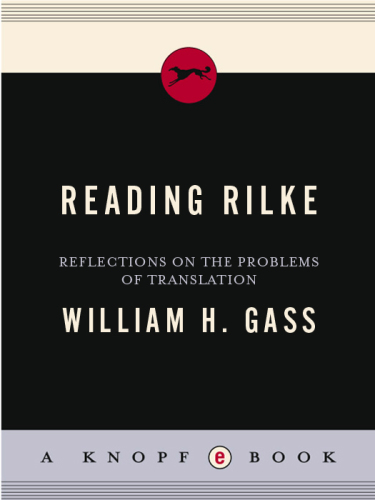
Reading Rilke
Reflections on the Problems of Translation
- اطلاعات
- نقد و بررسی
- دیدگاه کاربران
نقد و بررسی

August 30, 1999
In 1922, four years before he died of leukemia at age 51, Rilke finally completed the Duino Elegies, named for the castle where they poured out over an intensive four day (and night) period; within days of their completion, the Sonnets to Orpheus emerged as a reality-affirming coda. Rilke's dense and intricate verbal texture has made translation all the more irresistible over the years, and Gass, an intellectual eminence (Cartesian Sonata; Finding a Form; The Tunnel; etc.) is the first to meet the challenge discursively: this genre-bending book is a series of personal essays--at times veering between melodramatic and elliptical--that explore Rilke's biography as much as they address Gass's own difficult choices in the translations scattered throughout. Gass vividly evokes a poet "getting used to strange dark halls, guest beds, always cadging and scrounging, eating poorly," finding Rilke's lyrics "obdurate, complex, and compacted... displaying an orator's theatrical power, while remaining as suited to a chamber and its music as a harpsichord." In the translations themselves, however, Gass tends to replace complexity with unwarranted truism, as in the Fourth elegy--"but the contours of our feelings stay unknown/ when public pressure shapes the face we know"--as if to shield readers from the difficult and the strange. (Translations of all 10 elegies appear in an appendix at the book's end.) That said, Gass has an impressive ear for dramatic prosody, and a sensitivity to Rilke's playfulness and formal elegance (especially in the Tenth Elegy). Its willingness to be bold in a climate of scholarly restraint makes this translation one of the best available--superior, in particular, to the once-standard versions by Leishman and Spender, and to the recent versions of Stephen Mitchell.

Starred review from August 1, 1999
Anyone with a background in linguistics will agree with Gass (Finding a Form) when he emphatically asserts that "translation is a form of betrayal." In this country, when it comes to the pensive but unjustly neglected poetry of Rilke, Gass observes that challenging the obscure and difficult art of translation is essential in order to grasp Rilke's verse fully. Although not meant to be a primer for the novice, this work is, unlike traditional academic criticism, attainable and unambiguous. Gass elegantly scrutinizes the "ghosts" of Rilke's poetry, discussing recurrent themes such as the role of the poet, the cryptic character of death, space vs. time, and Rilke's unending love/hate attitude toward religion. He also gives a sharp-witted translation of the notable Duino Elegies, making previous interpretations seem inferior and somewhat insipid. While not original in its fastidious approach to Rilke's life (see Ralph Freedman's Life of a Poet, LJ 12/95), Gass's analysis remains original in its literary sensitivity, and this reviewer is especially envious of his effortlessly lyrical and mellifluous writing style. Gass has indeed succeeded in getting closer to unveiling Rilke in his rightful glory.--Mirela Roncevic, "Library Journal"
Copyright 1999 Library Journal, LLC Used with permission.

Starred review from September 1, 1999
Translation into English, especially within such an idiomatic genre as poetry, always poses a difficulty to the reader. Gass--a writer, poet, and translator--shows in painstaking detail what a translator goes through in order to produce a work that not only makes sense in English but remains faithful to the structure and meaning of the original language in which it was written. Rainer Maria Rilke wrote in a German so expressionistic, so often untranslatable, and so utterly beautiful in its original format, that he proves to be a good guinea pig for this experiment. Gass translates Rilke's poems himself and then takes critically regarded Rilke translations and compares them, line by line, often word by word. Gass dismisses many of the translations and gives his reasoning for it. Brutally honest, he sometimes dismisses his own translations; brutally catty, his dismissals are often delightfully acerbic. Gass is a beautiful writer, and he includes much on the life and influences of Rilke, for the history and background of a writer is as important as language when it comes to translation. Gass offers excellent interpretations of Rilke and an entertaining and provocative look at a subject that could be fearfully dreary. ((Reviewed September 1, 1999))(Reprinted with permission of Booklist, copyright 1999, American Library Association.)




دیدگاه کاربران